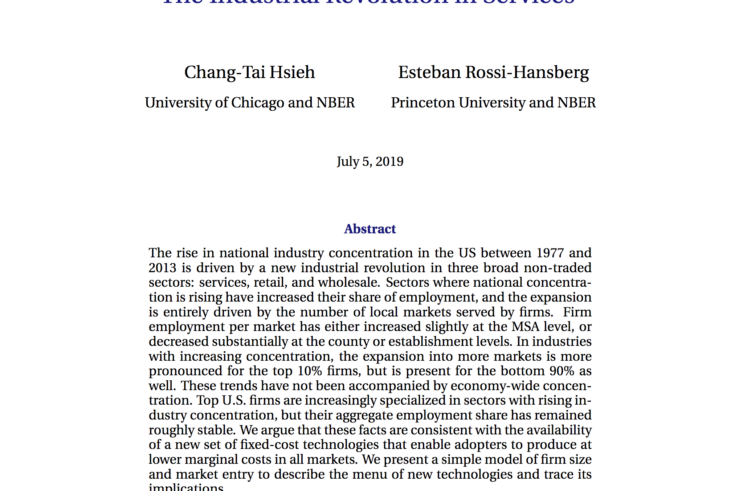Showing archive for: “Innovation & Entrepreneurship”
Towards a Democratic Antitrust
This symposium discusses the “The Politicization of Antitrust.” As the invite itself stated, this is an umbrella topic that encompasses a wide range of subjects: from incorporating environmental or labor concerns in antitrust enforcement, to political pressure in enforcement decision-making, to national security laws (CFIUS-type enforcement), protectionism, federalism, and more. This contribution will focus on ... Towards a Democratic Antitrust
What if rising concentration were an indication of more competition, not less?
An oft-repeated claim of conferences, media, and left-wing think tanks is that lax antitrust enforcement has led to a substantial increase in concentration in the US economy of late, strangling the economy, harming workers, and saddling consumers with greater markups in the process. But what if rising concentration (and the current level of antitrust enforcement) ... What if rising concentration were an indication of more competition, not less?
A New Office of Technology Assessment: The Wrong Answer to the Wrong Question at the Wrong Time
Congress needs help understanding the fast moving world of technology. That help is not going to arise by reviving the Office of Technology Assessment (“OTA”), however. The OTA is an idea for another age, while the tweaks necessary to shore up the existing technology resources available to Congress are relatively modest. Although a new OTA ... A New Office of Technology Assessment: The Wrong Answer to the Wrong Question at the Wrong Time
Economics is Dead. Long Live Economics! A Review of The Economists’ Hour
John Maynard Keynes wrote in his famous General Theory that “[t]he ideas of economists and political philosophers, both when they are right and when they are wrong, are more powerful than is commonly understood. Indeed the world is ruled by little else. Practical men who believe themselves to be quite exempt from any intellectual influence, ... Economics is Dead. Long Live Economics! A Review of The Economists’ Hour
The Snobbery of Bashing Big Tech
In the spring of 1669 a “flying coach” transported six passengers from Oxford to London in a single day. Within a few years similar carriage services connected many major towns to the capital. “As usual,” Lord Macaulay wrote in his history of England, “many persons” were “disposed to clamour against the innovation, simply because it ... The Snobbery of Bashing Big Tech
The Digital Policy of the Next EU Commission: All roads Lead to Margrethe Vestager
Ursula von der Leyen has just announced the composition of the next European Commission. For tech firms, the headline is that Margrethe Vestager will not only retain her job as the head of DG Competition, she will also oversee the EU’s entire digital markets policy in her new role as Vice-President in charge of digital ... The Digital Policy of the Next EU Commission: All roads Lead to Margrethe Vestager
Kochland: An Inadvertent Paean to the Glories of the Free Market
A recently published book, “Kochland – The Secret History of Koch Industries and Corporate Power in America” by Christopher Leonard, presents a gripping account of relentless innovation and the power of the entrepreneur to overcome adversity in pursuit of delivering superior goods and services to the market while also reaping impressive profits. It’s truly an ... Kochland: An Inadvertent Paean to the Glories of the Free Market
Why Don’t People Talk About Breaking Up Microsoft?
[This post is the seventh in an ongoing symposium on “Should We Break Up Big Tech?” that features analysis and opinion from various perspectives.] [This post is authored by Alec Stapp, Research Fellow at the International Center for Law & Economics] Should we break up Microsoft? In all the talk of breaking up “Big Tech,” ... Why Don’t People Talk About Breaking Up Microsoft?
The Third Circuit’s Oberdorf v. Amazon opinion offers a good approach to reining in the worst abuses of Section 230
[Note: A group of 50 academics and 27 organizations, including both myself and ICLE, recently released a statement of principles for lawmakers to consider in discussions of Section 230.] In a remarkable ruling issued earlier this month, the Third Circuit Court of Appeals held in Oberdorf v. Amazon that, under Pennsylvania products liability law, Amazon ... The Third Circuit’s Oberdorf v. Amazon opinion offers a good approach to reining in the worst abuses of Section 230
Section 230 principles for lawmakers and a note of caution as Trump convenes his “social media summit”
Neither side in the debate over Section 230 is blameless for the current state of affairs. Reform/repeal proponents have tended to offer ill-considered, irrelevant, or often simply incorrect justifications for amending or tossing Section 230. Meanwhile, many supporters of the law in its current form are reflexively resistant to any change and too quick to dismiss the more reasonable concerns that have been voiced. Most of all, the urge to politicize this issue — on all sides — stands squarely in the way of any sensible discussion and thus of any sensible reform.
GDPR After One Year: Costs and Unintended Consequences
GDPR is officially one year old. How have the first 12 months gone? As you can see from the mix of data and anecdotes below, it appears that compliance costs have been astronomical; individual “data rights” have led to unintended consequences; “privacy protection” seems to have undermined market competition; and there have been large unseen ... GDPR After One Year: Costs and Unintended Consequences
Balancing competition and innovation in the drug industry: An evaluation of current proposals.
Last week the Senate Judiciary Committee held a hearing, Intellectual Property and the Price of Prescription Drugs: Balancing Innovation and Competition, that explored whether changes to the pharmaceutical patent process could help lower drug prices. The committee’s goal was to evaluate various legislative proposals that might facilitate the entry of cheaper generic drugs, while also ... Balancing competition and innovation in the drug industry: An evaluation of current proposals.







